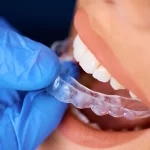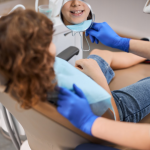
Does Invisalign Work? Exploring Its Pros, Cons, and Effectiveness
May 13, 2024
Navigating Dentistry for Children: A Parent’s Guide to Healthy Smiles
June 10, 2024Dental emergencies can be distressing and often catch us off guard. Recognizing a dental emergency quickly and acting fast can help protect your oral health and avoid more severe problems. In this guide, we will delve into what constitutes a dental emergency, common signs and symptoms, essential steps to take during an emergency, the importance of timely treatment, preventive measures to reduce the risk of emergencies, and the impact of dental emergencies on overall oral health.
Defining a Dental Emergency
Dental emergencies are urgent oral health issues that need immediate attention to stop pain, prevent more damage, or save a tooth. It is essential to distinguish between urgent and non-urgent dental problems to ensure that appropriate care is provided promptly. Examples of dental emergencies include severe toothaches, traumatic injuries such as knocked-out teeth, fractured teeth, and soft tissue injuries, as well as infections and abscesses that cause intense pain and swelling.
Symptoms and Signs
Recognizing the symptoms and signs of a dental emergency is vital for prompt intervention. Severe toothache, often accompanied by swelling and difficulty eating or speaking, is a common indicator of an urgent dental issue. Persistent bleeding from the mouth, especially after an injury or dental procedure, should also be considered a red flag. If you have a broken tooth, a cut in your mouth, or a loose dental restoration, you should see an emergency dentist immediately.
It is important to address dental problems promptly in order to prevent further complications. Ignoring these dental issues can lead to more severe dental issues in the future. A dentist can assess the situation and provide the necessary treatment to fix it.
Types of Dental Emergencies
Dental emergencies encompass many conditions, each requiring specific management and treatment. Understanding the different types of dental emergencies is crucial for identifying and responding appropriately to urgent oral health issues.
Traumatic Injuries
These injuries can occur from accidents, sports injuries, falls, or physical altercations and may include knocked-out teeth, fractured teeth, and soft tissue injuries.
- Knocked-Out Teeth: Immediate action is necessary to preserve the tooth and increase the chances of successful reimplantation.
- Fractured Teeth: Treatment may involve bonding, dental crowns, or root canal therapy based on the severity and location of the fracture.
- Soft Tissue Injuries: Proper wound care and evaluation by a dentist are essential to prevent infection and promote healing.
Infections and Abscesses
These serious conditions result from untreated tooth decay, gum disease, or previous dental procedures and may manifest as tooth abscesses, gum abscesses, or facial swelling.
- Tooth Abscess: Symptoms include severe, throbbing pain, swelling, and sensitivity to hot or cold temperatures.
- Gum Abscess: Symptoms may include swollen gums, pain, and drainage of pus.
- Facial Swelling: Immediate treatment is necessary to prevent the infection from spreading and causing systemic complications.
Severe Pain and Swelling
Intense pain and swelling in the mouth, jaw, or face can indicate underlying dental issues, such as dental nerve pain or jaw dysfunction, that require immediate evaluation and treatment.
Complications from Dental Procedures
Occasionally, complications can arise following dental procedures such as tooth extractions, root canals, or dental implant placements, leading to conditions like dry sockets or injury to adjacent teeth or tissues.

What to Do in a Dental Emergency
If you have a tooth emergency, it’s important to act quickly to reduce pain to prevent any more problems. First, assess the seriousness of the situation. Focus on addressing immediate concerns such as stopping bleeding, using pain relievers, and applying cold packs to reduce swelling.
If a tooth is knocked out, handle it carefully by the crown (top part), avoid touching the root, and try reinserting it into the socket if possible. Seek emergency dental care immediately for professional evaluation and dental treatment.
Preventing Dental Emergencies
While dental emergencies can occur unexpectedly, preventive measures can greatly decrease the risk and severity of emergencies. Regular dental appointments and cleanings help to detect and address oral health problems early, preventing them from escalating into emergencies.
Maintaining good oral hygiene practices, such as brushing twice daily, flossing daily, and using mouthwash, decreases the risk of tooth decay and gum disease risk. Additionally, wearing protective gear during sports activities, such as mouthguards for contact sports, prevents dental injuries. Avoiding habits like chewing hard objects or using teeth as tools also help prevent dental emergencies.
Impact of Dental Emergencies on Overall Oral Health
Dental emergencies cause immediate pain and discomfort and can lead to lasting effects on oral health. Untreated dental infections and abscesses can spread to other body parts, causing systemic health issues. Tooth loss resulting from dental emergencies can affect speech, chewing ability, and quality of life. Moreover, the psychological impact of dental emergencies, such as anxiety and fear of future dental visits, can further exacerbate oral health problems.
Understanding a True Dental Emergency
Understanding what constitutes a dental emergency empowers individuals to respond effectively during critical situations. Recognizing the signs and symptoms, taking immediate action, and seeking professional dental care without delay are critical aspects of managing dental emergencies successfully. Individuals can safeguard their smiles and overall well-being by prioritizing oral health, staying prepared, and knowing when to seek emergency dental services.
Knox Mountain Dentistry in Kelowna offers emergency dental services for patients with urgent oral health issues. We provide quick and effective care. If you have a dental emergency, contact our emergency line and book an appointment.
